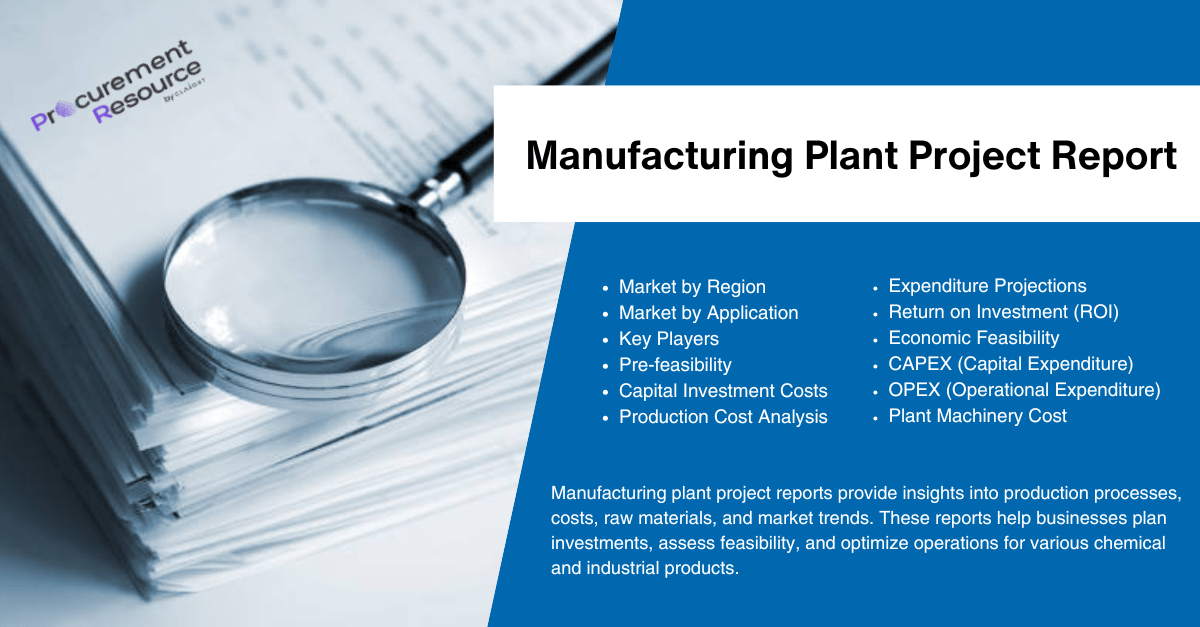Decanol (C₁₀H₂₁OH), also known as decyl alcohol, is a fatty alcohol widely used in the production of surfactants, plasticizers, lubricants, and personal care products. With increasing demand from the cosmetics, pharmaceutical, and chemical industries, establishing a Decanol Manufacturing Plant presents a lucrative business opportunity.
Procurement Resource, a leading market intelligence firm, has released an in-depth Decanol Manufacturing Report, providing entrepreneurs and investors with critical insights into market trends, production processes, cost analysis, and investment feasibility.
Market Overview and Industry Trends
Growing Demand for Decanol
Decanol is a key ingredient in:
- Surfactants & Detergents (major application, ~40% market share)
- Plasticizers (for PVC and other polymers)
- Personal Care Products (lotions, creams, and hair care formulations)
- Pharmaceuticals (as an emulsifier and solvent)
- Lubricants & Additives (industrial applications)
The global fatty alcohols market, including decanol, is projected to grow at a CAGR of 5.2% (2024–2030), driven by rising demand for bio-based surfactants and eco-friendly personal care products. The Asia-Pacific region dominates consumption due to rapid industrialization, while North America and Europe focus on high-purity decanol for premium applications.
Sustainability and Bio-based Alternatives
With rising environmental awareness and stricter regulations on chemical manufacturing, the decanol market is witnessing a significant shift toward sustainable, bio-based production methods. Traditionally, decanol is synthesized from petrochemical feedstocks, which contribute to carbon emissions and rely on finite fossil resources. However, advancements in green chemistry have enabled the production of decanol from renewable plant-based sources, such as palm kernel oil and coconut oil. These bio-based alternatives not only reduce the carbon footprint but also align with global trends in eco-friendly manufacturing, circular economy principles, and corporate sustainability goals.
- Regulatory Pressure – Increasing environmental policies and emission controls encourage industries to move away from fossil-derived alcohols.
- Renewable Feedstocks – Utilization of palm kernel oil or coconut oil provides a sustainable, plant-based raw material source.
- Lower Carbon Footprint – Bio-based production reduces greenhouse gas emissions compared to petrochemical routes.
- Green Chemistry Innovation – Processes minimize hazardous waste, energy consumption, and environmental impact.
- Market Demand for Eco-friendly Products – Consumer preference for sustainable personal care, cleaning, and industrial products drives demand.
- Corporate ESG Commitments – Companies are integrating renewable chemicals into supply chains to meet sustainability targets.
Read Full Report With Table Of Contents: https://www.procurementresource.com/reports/decanol-manufacturing-plant-project-report/toc
Decanol Manufacturing Process
Raw Material Requirements
Primary feedstocks include:
Petrochemical Route:
- n-Paraffin (C10 fraction) → Oxidation → Decanol
- Olefins (via Ziegler or Oxo process)
Bio-based Route:
- Palm Kernel Oil / Coconut Oil → Hydrolysis → Fatty Acids → Hydrogenation → Decanol
Production Methods
Oxo Synthesis (Petrochemical Route)
- Propylene + Syngas (CO + H₂) → Hydroformylation → Aldehyde → Hydrogenation → Decanol
- Requires cobalt or rhodium catalysts
Ziegler Process
- Ethylene + Triethylaluminum → Oligomerization → Oxidation → Decanol
- Higher purity but more expensive
Fatty Alcohol Production (Bio-based Route)
- Natural Oils → Transesterification → Methyl Esters → Hydrogenation → Decanol
- Preferred for sustainable & biodegradable products
Purification & Distillation
- Fractional distillation to achieve ≥98% purity
- Molecular sieves for drying
Plant Setup and Machinery Requirements
Infrastructure & Location Selection
- Land Requirement: ~5,000–10,000 sq. meters (medium-scale plant)
- Utilities:
- Steam, cooling water, hydrogen supply (for hydrogenation)
- Nitrogen blanketing (for safety)
- Storage: Stainless steel / epoxy-coated tanks
Key Machinery & Equipment
- Hydrogenation Reactors (High-pressure, stainless steel)
- Distillation Columns (Fractional & Vacuum)
- Heat Exchangers & Condensers
- Catalyst Recovery System
- Automated Control System (DCS/PLC)
- Safety Systems (Explosion-proof equipment, gas detectors)
Labor & Workforce
- Chemical Engineers & Process Operators
- Quality Control Analysts (GC/HPLC testing)
- Maintenance & Safety Personnel
Cost Analysis and Financial Feasibility
Capital Investment Breakdown
| Component | Estimated Cost (USD) |
|---|---|
| Land & Site Development | $1M – $2M |
| Machinery & Equipment | $4M – $7M |
| Utilities & Installation | $1.5M – $3M |
| Licensing & Compliance | $500K – $1M |
| Working Capital | $2M – $4M |
| Total Estimated Cost | $9M – $17M |
Operating Costs
- Raw Materials (n-Paraffin / Natural Oils): ~50–60% of production cost
- Catalysts & Chemicals: ~15–20%
- Energy (Hydrogen, Steam): ~10–15%
- Labor & Maintenance: ~8–12%
Profitability & ROI
- Selling Price of Decanol: $2,000 – $3,500/ton (depending on purity)
- Annual Production Capacity: 20,000 – 50,000 tons (medium-scale plant)
- Projected Revenue: $40M – $175M/year
- ROI Period: 4–7 years
Regulatory and Environmental Considerations
Safety & Compliance
- OSHA, REACH, & EPA Regulations (flammable liquid handling)
- Wastewater Treatment (neutralization of acidic by-products)
- Explosion-Proof Equipment (due to hydrogen use)
Green Manufacturing Initiatives
- Bio-based Feedstock Adoption (for sustainable production)
- Catalyst Recycling (reducing chemical waste)
Why Choose Procurement Resource’s Report?
The Decanol Manufacturing Plant Project Report includes:
- Market Demand Analysis – Regional trends & competitive landscape
- Process Flow Diagrams – Detailed petrochemical & bio-based routes
- Machinery & Cost Breakdown – CAPEX & OPEX estimations
- Regulatory Compliance Guide – Meeting global safety standards
Get Your Free Sample Report Today:
Decanol Manufacturing Plant Project Report by Procurement Resource” refers to an opportunity for businesses, investors, and industry professionals to access a complimentary sample of a detailed market and feasibility report on setting up a decanol manufacturing plant. This report, prepared by Procurement Resource, provides comprehensive insights into the production process, raw material requirements, cost structure, market trends, and potential profitability of decanol manufacturing. By obtaining the free sample, stakeholders can preview the quality and depth of analysis offered, helping them make informed decisions about investments, operational planning, and strategic development in the decanol industry. It serves as a valuable first step for anyone considering entering or expanding in the market.
Request a free sample: https://www.procurementresource.com/reports/decanol-manufacturing-plant-project-report/request-sample
Contact Information
Company Name: Procurement Resource
Contact Person: Ashish Sharma (Sales Representative)
Email: sales@procurementresource.com
Location: 30 North Gould Street, Sheridan, WY 82801, USA
Phone:
UK: +44 7537171117
USA: +1 307 363 1045
Asia-Pacific (APAC): +91 1203185500
Connect With Us Online:
https://www.linkedin.com/company/procurement-resource-official






